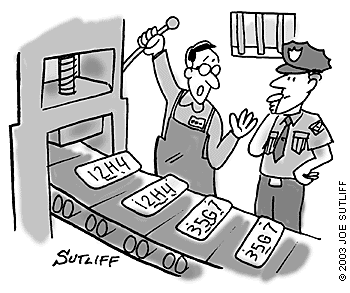
Fam Pract Manag. 2003;10(4):29-30
Malpractice crisis spreads; legislation pending
The House of Representatives passed a bill (HR 5) in March that would cap noneconomic damages in medical malpractice lawsuits at $250,000 and limit punitive damages to twice the amount of economic damages or $250,000, whichever is higher. At press time, the legislation, known as the HEALTH Act, was expected to face a filibuster in the Senate.
Meanwhile, the AMA has added six states – Arkansas, Connecticut, Illinois, Kentucky, Missouri and North Carolina – to its list of those facing a medical malpractice insurance crisis. Previously, the AMA had found that the cost of medical malpractice insurance had reached crisis proportions in 12 states, with 30 additional states near crisis. “There is something terribly wrong when dedicated professionals, who have trained for years, want to give up the work of a lifetime and retire, move to another state or stop offering high-risk procedures such as delivering babies. But that is precisely what is happening because of America’s broken medical liability system,” AMA President Yank Coble Jr., MD, said.
According to a Department of Health and Human Services (HHS) report, “the crisis has only worsened, in both scope and intensity” since one year ago. According to the report, the main factor behind the crisis is an increase in mega-awards and settlements, particularly for noneconomic damages. The report is available online at www.hhs.gov/news/press/2003pres/20030303.html.
Physicians, patients have differing views on disclosing errors
While physicians and patients agree that harmful errors should be disclosed, they don’t always agree on the substance of the disclosure, according to a study in the Feb. 26 JAMA. The study, which consisted of physician and patient focus-group participants discussing hypothetical medical errors, found that patients want to know when an error occurs, why it happened, how it will be corrected and how it will be prevented in the future. Physicians in the study agreed that patients should know of an adverse event but said they often avoid the term “error” and don’t explain why it happened or how it could be prevented. Some of the physicians said they don’t disclose errors when the harm is trivial, the patient can’t understand the error or the physician feels that the patient doesn’t want to know about the error. The study also found that neither patients nor physicians are getting adequate emotional support after an error is disclosed. Patients prefer an apology from the physician; physicians worry that an apology will create legal liability. And physicians are unsure where to seek emotional support for themselves.
PRACTICE PEARLS from here and there
A heartfelt bonus
Cut costs in your practice by giving employees bonuses that come from the heart instead of the budget. For example, consider giving your staff time off with pay instead of the traditional cash bonus.
– Woodcock E. Top cost-cutting strategies for 2003.
Physicians’ Practice Pearls. Feb. 13, 2003.
PRACTICE PEARLS from here and there
Preventing medication errors in children
The Center for the Advancement of Patient Safety at U.S. Pharmacopoeia recently issued the following recommendations for preventing medication errors in children. These recommendations are based on an analysis of more than 100,000 medication errors reported to its national database in 2001, more than 3,000 of which involved children under 16:
Liquid medications dispensed in the outpatient setting should be dispensed with appropriate measuring devices and instructions for use. When possible, use of the measuring device should be demonstrated to the patient/caregiver.
To prevent tenfold overdoses, a terminal or trailing zero should never be used after a decimal. A leading zero should always precede a decimal expression of less than one.
The patient’s weight, age and other appropriate dose indicator(s) should be available and clearly identified on all prescriptions and orders before the dose is dispensed and administered.
Abbreviations, acronyms and symbols used throughout an organization should be standardized and readily available. A list of abbreviations, acronyms and symbols that should not be used should also be available.
For more recommendations, go to www.usp.org/e-newsroom and select the Jan. 21 release.

How low can you go?
The Medicare Payment Advisory Commission (MedPAC) issued a report to Congress last month recommending that many providers in the Medicare program receive no pay increase in 2004 and that physicians receive only a modest increase. Arguing that “in general, Medicare payments are adequate to cover the costs of efficient providers,” Med-PAC suggested that Congress update 2004 payments for physician services by the projected change in input prices (3.4 percent) less a 0.9 percent adjustment for productivity growth, a net of 2.5 percent.
Medicare spending vs. private spending
During the last 30 years, Medicare health care spending per enrollee grew more slowly than spending by private health care insurers, reports a study in the March/April 2003 Health Affairs. Medicare spending grew at an average annual rate of 9.6 percent compared with 11.1 percent for private insurers. The study authors attribute Medicare’s success at controlling costs to its ability “to price aggressively for the services it covers.”
Backlog reduction 101
Patients wait seven months on average to see a primary care physician at Department of Veterans Affairs (VA) health care facilities and wait 1.6 hours on average to see a doctor after arriving at the clinic, according to a survey by the American Legion, reported in the March 4 Washington Post. The VA is trying to eliminate its backlog by ensuring that all primary care physicians carry a load of 1,200 patients, instituting home-care visits, using the Internet to allow patients to communicate with physicians and using home-monitoring equipment.
Time is money
Increasing numbers of physicians are charging fees of $10 to $20 for services such as renewing prescriptions or offering medical advice over the phone. A Feb. 22 Associated Press report attributes this trend to the large number of administrative duties physicians find themselves performing gratis. Although patients might begrudge the new fees, one physician explained, “If I can’t bill for my time, I can’t survive.”